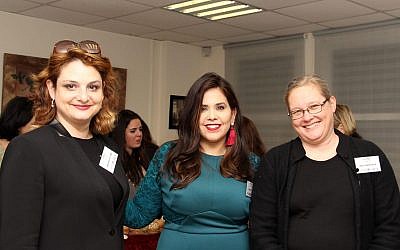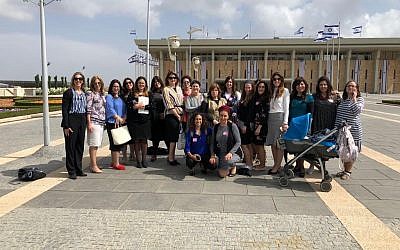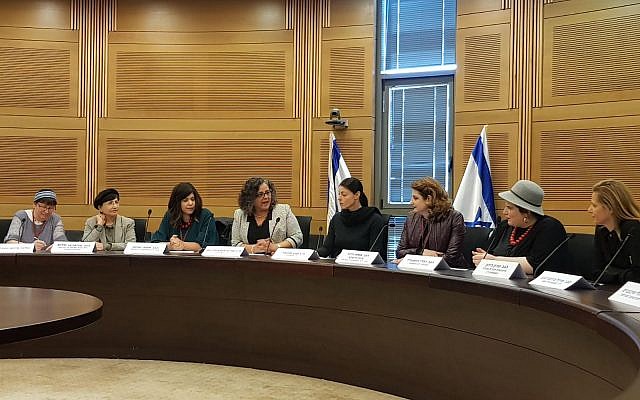No voice, no vote
July 9, 2018 – Nancy Strichman, The Times of Israel: Featured Post (The Blogs)
Denying political representation to over half a million Haredi women in Israel is unacceptable in 2018
When I moved to Israel 20 years ago, I assumed that the idea of women fighting for the right to hold political office was a debate safely in the history books. Surely this is not relevant today. Yet it was only recently did I realize how wrong I had been.
Over the past year, while researching women’s issues in Israel, I learned about the story of two brave Haredi activists, Esti Shushan and Estee Rieder Indursky. As one of the many examples in which art is being used as tool for social change, I heard that they were using the film “Suffragette” as a tool to raise awareness in Israel. The film tells the story of the struggle for women’s voting rights in Great Britain in the early 20th century
And why is this relevant today? Because ultra-Orthodox women are not able to be elected to office within their political parties. Yes, they are permitted to vote. But they can only vote for men. As written into the bylaws of the ultra-Orthodox parties, they are prohibited from holding an officially elected public role.
And so, as Esti and Estee explain: “The starting point is absolutely zero for Haredi women. Nothing, not even one woman on a city council or a school committee from Metulla to Eilat.” Their own personal journeys gradually led them to understand the price of this silence, and the link between a lack of political representation and the rise in ultra-Orthodox efforts to exclude women from all public life. In speaking out publicly against this, Esti and Estee — these “Haredi suffragettes” — are making history in their battle now, just as women who fought for the vote a century ago did too. It was the understanding of what has been sacrificed by excluding women from public decision-making processes that has led them to take on this herculean effort.

Ultra-Orthodox extremism in recent years has rightfully grabbed headlines. We hear of battles by activists to challenge the efforts to erase women from public life within the Haredi community — from the removal of women’s images in children’s books to the “men only” sidewalks, from segregated university classrooms to women relegated to the back seats of public buses.
Yet what has managed to remain under the radar for 70 years is the fact that there are no elected female representatives within the Haredi political apparatus. It has actually been the status quo since the establishment of Israel. What is groundbreaking now is that a group of Haredi women activists are willing to challenge this reality.
So is this battle worth the risks involved? As Esti and Estee explained to me, they have been told time and time again by both women and men that their struggle is not worth the heavy price. This price includes the threats and ostracism that they themselves and others face for their activism, where social sanctions can even affect marriage prospects and educational opportunities for their children. They have also been told, most irritatingly and predictably, that men can and do represent women’s interests best. We have all heard this argument before of course — back 100 years ago when suffragettes fought for the right of women to vote.

And this should matter to all of us, regardless of whether we are Haredi. Consider, if you will, what Israel could be like if there were greater efforts to engage women in politics, especially within the ultra-Orthodox parties. History has shown us that more attention would be paid to social issues that deeply affect the health of families and the strength of communities. Topics such as drug use, divorce, child abuse and domestic violence that are taboo subjects now, particularly in the Haredi community, might be brought more to the fore. So it is in all of our interests to support this struggle within the ultra-Orthodox community even if we do not believe that this is our struggle or that the struggle has already been won for us.
Esti and Estee, who established “Nivcharot” in 2014, are working to create support networks both from inside and outside their community to advance women’s representation in politics. The “Nivcharot” organization, with its campaign: “Lo Nivcharot Lo Boharot” or “No Voice, No Vote,” is daring to challenge the restrictions against women in the ultra-Orthodox political parties that have been in place for so many years. Their fight has now gone all the way to the Israeli Supreme Court and even the United Nations, as the barring of women from holding public office is a violation of international law.
The momentum is slowly moving in their direction, and we can only hope that this will be a time when we can see history in the making. All of us, regardless of religious affiliation, gender or political leanings, should recognize that denying political representation to over half a million women in Israel is unacceptable in 2018.







